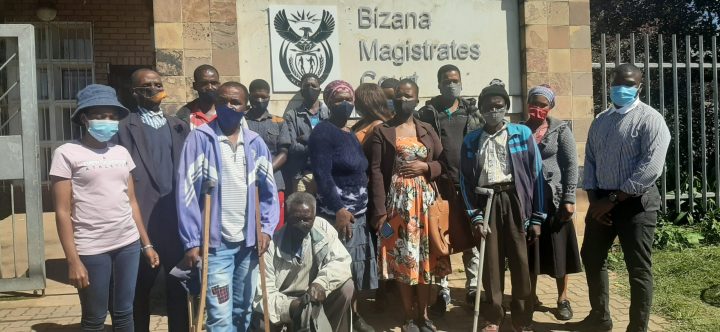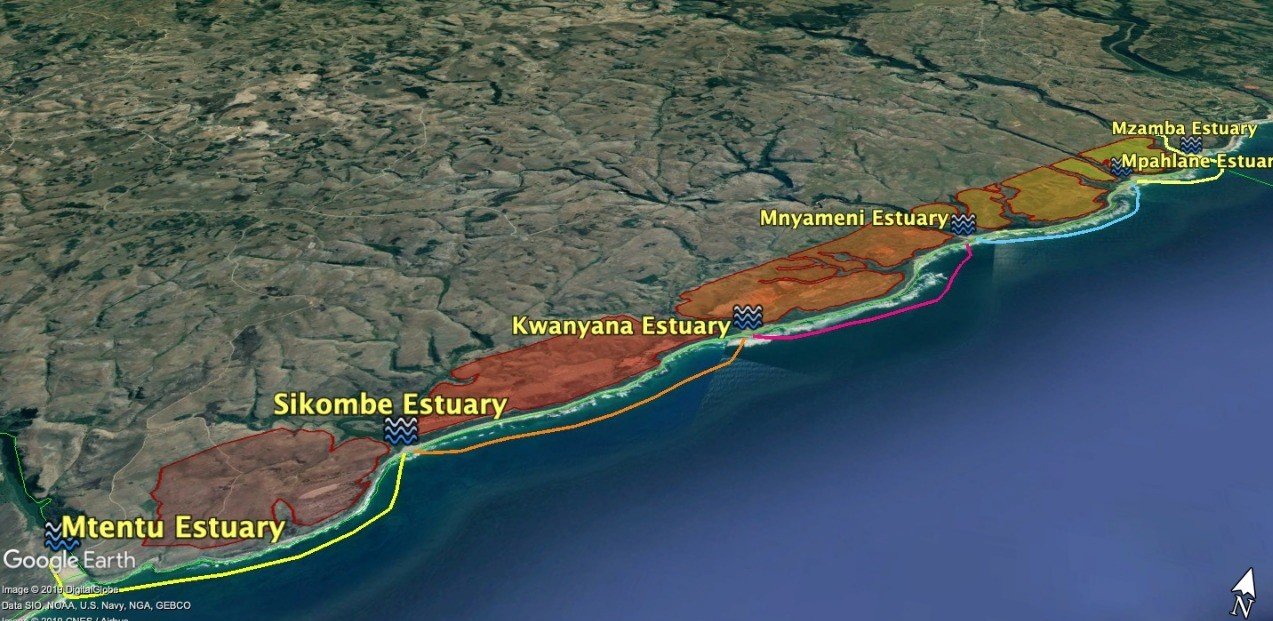GROUNDUP
Trial will shed light on Wild Coast violence

Community is split, even within families, on whether mining should be allowed to take place.
First published in GroundUp.
A trial related to an outbreak of violence over the Xolobeni Mineral Sands Project looks set to expose deep and bitter divisions in the Amadiba community on the Wild Coast.
Even close family members have been caught up on opposite sides of the cycle of violence, and to date, there have not been any notable prosecutions.
But this could change after 11 February when five accused stand trial in the Bizana magistrates court on charges ranging from attempted murder, assault to do grievous bodily harm, vandalism, housebreaking and theft. Their victims were allegedly people opposed to the mining plans, including Tholozani Dlamini, who now suffers from a crippled leg.
The mining plans are spearheaded by the Australian mining company, Mineral Commodities Ltd. It describes the Xolobeni Project as “one of the largest undeveloped mineral sands resources in the world”. The sand dunes along the proposed mining area – a 22km stretch of pristine coastline stretching from the Mtentu Estuary in the south to Mzamba mouth near Port Edward in the north, are said to contain more than 9,000,000 tons of ilmenite, titanium-iron oxide mineral, as well as rutile, zircon and leucoxene.
For more than ten years the mining plans have been strongly supported by South Africa’s Department of Mineral Resources and Energy, several businessmen, black empowerment partners and the political elite in the Bizana district municipality. They argue that it will bring economic upliftment and huge benefits to people in the Amadiba district — one of the poorest regions of South Africa where people are largely dependent on subsistence agriculture.
But from the outset, the mining plans were met with strong resistance from environmental groups and people who stand to lose their land, their pastoral way of life, and opportunities to develop sustainable eco-tourism enterprises.
In 2007, the Amadiba Crisis Committee was formed to represent rural villagers opposed to the mining plans. Its members complain that they have since been subjected to coercion, intimidation and violence orchestrated by leading pro-mining lobbyists, many of whom, in turn, blame the media for sowing division by reporting on unsubstantiated allegations.
The case before the Bizana magistrates court relates to violence in the Mdatya area in December 2015.
Two of those accused of attacking people opposed to the mining are, Xolile and Mzukhona Dimane. Ironically, they are both sons of the late Scorpion Dimane who was a leading opponent of the mining.
Despite a death certificate stating that Scorpion died of natural causes – a middle ear infection – in late 2007, several media reports have given voice to suspicions that Dimane might have been poisoned because of his stance against the mining.
Such claims have been repeatedly slammed by Dimane’s nephew, Zeka Mnyamane, a former chairman of the Xolobeni Empowerment Company (Xolco) which was set up as a BEE beneficiary of the mining project. He said these allegations caused confusion and could even lead to violence.
The trial of the Dimane brothers and three other accused, all arrested as far back as January 2016, was set down for hearing this week but was postponed for the tenth time as two of the accused were suspected to be sick with Covid-19.

The five mining blocks of the proposed Xolobeni Mineral Sands Project extend 22km along the Wild Coast, from the Mtentu estuary in the south to the Mzamba River mouth near Port Edward in the north. (Image: Google Earth)
The court record is now mostly made up of notes on previous postponements of the trial for a myriad of different reasons.
On 18 November 2019, defence attorney, Unathi Ximbi, had also attempted to have the matter struck off the roll, arguing that there was insufficient evidence against the accused. He requested the case be postponed pending the outcome of representations made to the Director of Public Prosecutions on behalf of his clients.
In March last year, the regional chief prosecutor, WV Genu, replied: “Having considered your representations … and having read the docket, I am of the view that the state has a very strong case against the accused and I therefore direct that the case must proceed.”
Following this week’s postponement of the case until 11 February, Zolile Shude, a litigation consultant from Richard Spoor Attorneys voiced concern about the repeated postponement of the case. “It has been five years since the commission of these crimes and no justice has been served. This has an effect on our clients who have been calling for justice all along, but they have not lost hope. We hope the trial will finally commence on the said dates. Perhaps the 11th time is a charm, but we wait to find out.”
Ximbi said his clients were not deliberately delaying the trial. “They also have their own story that they want to tell.” He said it was tragic that people who were either for or against the mining had become caught up in a vicious conflict in which there were no angels.
“Neither party can claim to be clean,” said Ximbi.
In the meantime, the Xolobeni Mineral Sands Project has been put on hold following a ruling by Judge Annali Basson of the Pretoria high court, stating that the Department of Mineral Resources and Energy, could not grant mining rights without first obtaining the full and formal consent of the people in the community.
Mineral Resources Minister, Gwede Mantashe, subsequently lodged an application for leave to appeal but has yet to pursue this.
Mantashe also said the department would conduct a comprehensive survey to establish how many people living in the area were in support or opposed to the mining. The department has yet to respond to GroundUp’s queries, submitted in November last year, on the status of this proposed survey. DM




















 Become an Insider
Become an Insider
Comments - Please login in order to comment.